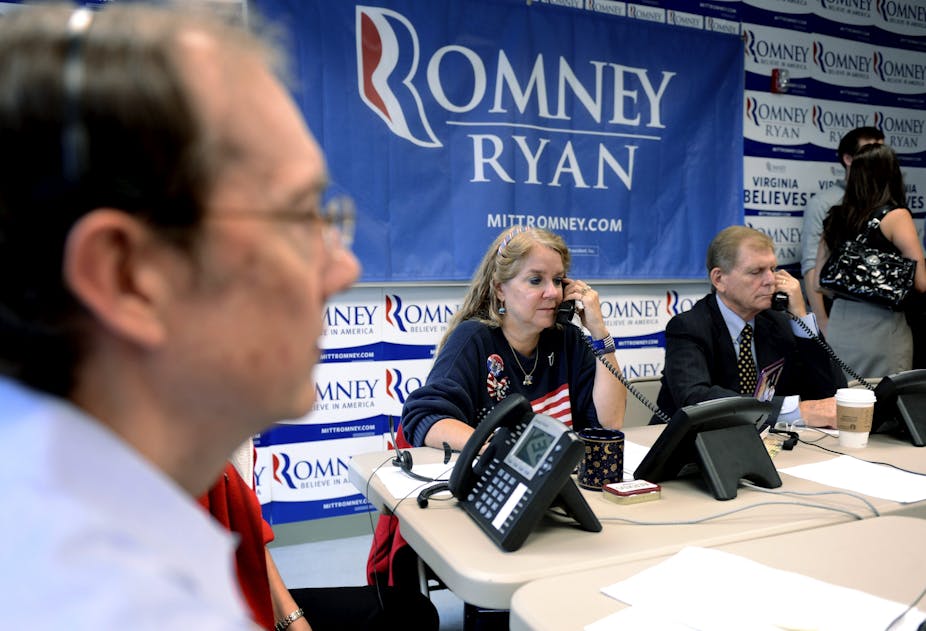Hurricane Sandy will leave more than physical destruction in its wake. Arriving just days before the US presidential election, the storm could have a political fallout as well.
Sandy has affected the key battleground states of Virginia, Ohio, and Pennsylvania, and may complicate matters by shutting down early voting, at least for a few days. Turning out early voters was a key aspect of Obama’s ground game. It is unclear whether voters who would have voted early in those states will turn out on election day or simply stay home. Generally, inclement weather or obstacles to voting benefit Republican candidates and decrease turnout among racial/ethnic voters, who are key to Obama’s electoral success.
But how important is “getting out the vote” in the US?
When I present my research on get-out-the-vote efforts, audience members (mostly youth) often ask, “Why should we care about voting? It doesn’t really matter anyway.”
My answer is to point out the significant time, resources, and political capital that has been spent, just over the past few years, passing laws that restrict voter registration efforts and establish voter identification requirements in the United States – laws that the Brennan Center for Justice estimates will disenfranchise the 11% of the eligible voters that do not have a government-issued photo ID. That percentage is higher among the elderly, the poor, voters of colour, and those with disabilities.
What America needs is a movement to expand political participation, rather than restricting it. In 2008, 56.8% of the voting age population turned out to vote, which is closer to what can be expected in Burundi or Congo than France or Australia. Given the 2008 US voting age population was about 230 million, that leaves over 99 million Americans who were eligible to vote but chose not to go to the polls.
More than a decade of experimental research in political science has shown that getting these voters to the polls requires direct get-out-the-vote contact. My recent book, Mobilizing Inclusion, demonstrates that door-to-door canvassing and live phone banks are quite effective in turning out low-propensity racial/ethnic voters. Two-call phone banks - those that call back voters that express a commitment to voting in the first call - can have a double-digit effect on turnout. In low-propensity voting communities, this can have a significant impact on the shape of the electorate, often making the difference in terms of winners and losers. In other words, if you invite these voters to vote, they will, and they will make a difference.
Yet despite this strong evidence, most US political campaigns do not target these voters. Much has been made recently about the significant ground campaigns being employed by both presidential campaigns. In 2008, Barack Obama set records, and altered political common knowledge, by investing heavily in organising offices around the country.
In 2012, the Republican National Committee (RNC) is expected to spend significant resources, including $22 million in September 2012 alone, to pay for ground-game activities in battleground states, including staffing, phone calls, polling, targeting, voter registration efforts, and other data efforts. It is unlikely, however, that the RNC’s estimated 600 paid staff members and thousands of volunteers will be able to contact the 99 million American voters that need to be asked to turn out. It’s also unlikely that their focus will be on low-propensity, racial/ethnic voters.
These are the same voters that are most likely to be negatively affected by the new voter ID laws. These laws are not new. Historically, U.S. states have used a variety of tactics, including voter roll purges, poll taxes, and the white man’s primary, to keep eligible racial/ethnic voters from voting. If voting doesn’t matter, why would the states continue to bother to pass restrictive laws to limit eligible voters’ access to the ballot?

What many Americans do not know is that, internationally, these laws place the United States alongside countries the U.S. often frames as “bad actors”, those that are not “true” democracies. In Resolution 46/137, the UN General Assembly affirmed that:
The systematic denial or abridgement of the right to vote on grounds of race or colour is a gross violation of human rights and an affront to the conscience and dignity of mankind, and … the right to participate in a political system based on common and equal citizenship and universal franchise is essential for the exercise of the principle of periodic and genuine elections.
American electoral observers often criticise foreign governments for implementing precisely these types of electoral restrictions because they limit the exercise of a “common and equal citizenship”. These restrictions on the American franchise are especially problematic given that the United States has some of the lowest voting rates of any advanced, industrialised country.
For America’s democratic institutions to be legitimate, the electorate needs to reflect the population. Instead, states around the country have passed the restrictive voting laws noted above; laws that will restrict ballot access for an estimated five million Americans.
Clearly, this approach to voting leaves out the voices of a significant portion of America’s eligible voters. It’s time to reframe political participation in the United States, and start inviting these Americans in, one voter by one.

